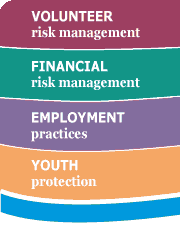Risk Management Essentials
Articles from the Winter 2016 Print Edition
Safe and Secure: Supporting International Staff
The safety and well being of employees is generally a top-of-mind concern for nonprofit leaders. When an organization deploys its staff internationally, additional uncertainty enters the already complex risk landscape. Deployed staff members may work in limited resource environments or in conditions of cultural and political instability. Issues that might seem routine at home (preventative or minor medical care, travel-related incidents) require additional resources when dealt with in many international settings. Stakes escalate considerably in the event of emerging natural or man-made crises (weather disasters, epidemics, random or planned physical violence).
The Duty of Care and Travel Risk Management Global Benchmarking Study (2011) conducted by International SOS identified members of the nongovernmental organization (NGO) sector as being highly aware of travel-related threats and vulnerability to harm. Despite that awareness, a perennial challenge is translating general concern about staff safety into practical, sustainable strategies to address perceptions as well as real vulnerability to harm. more…
Go Global and Get Local: Complying with International Employment Laws
Beginning work in a new country can be very exciting and a great way to further your organization’s goals and mission. Whether your organization provides educational opportunities or medical care or aid after an emergency, providing services in another country can open the door to a variety of new opportunities and challenges. When determining whether to expand your nonprofit’s offerings to a new country, there are many important things to review and consider. Major factors that will play into your decision will include the amount of resources (money, supplies, people) your nonprofit has available, the needs of the target country, and the legal landscape for employment and charity services in the target country. more…
We Are the World: International Staff Screening
Your goal of recruiting capable staff members who bring different perspectives and diverse backgrounds to your mission may lead you to seek and consider applicants who have worked, lived, or even studied in a country on the other side of the globe. A recent survey by HireRight indicated that more than half of employers are considering applicants who have studied or worked overseas.
While the staffing needs of nonprofit organizations vary to a great degree, there is ample evidence that the commitment to appropriate, consistent screening of prospective employees and volunteers is deepening within mission-driven organizations. As discussed in the Center’s book, Staff Screening Notebook: 10 Steps to Quality Staffing, “The advent of the Internet heralded a giant step in the amount of easily available information concerning applicants for paid and volunteer positions.” How might traditional screening mechanisms be made more relevant to organizations considering international applicants? more…
Foreign Agent Registration & Funding Restrictions for NGOs
Any U.S.-based nonprofit that operates internationally must cling to a complex web of regulations in each country where its presence is felt. Local labor laws, restrictions on financial transactions and banking, and restrictions on the use of foreign consultants are just a few of the hoops that U.S. non-governmental organizations (NGOs) must jump through to support grantees and programs in other countries.
While most NGOs exist for completely altruistic reasons—in the hopes of advancing human rights, health, economic prosperity, democracy, and conservation—many governments across the world place a high level of scrutiny on NGOs, due to concerns that foreign entities and their foreign funding suggest political influence from outside nations. Some governments might also be wary of cultural influences from visiting NGOs, which potentially threaten to alter local customs and power structures. To continue operating internationally, NGO leaders must stay informed of changing laws that require foreign entities to jump through hoops—some purposefully difficult—before providing aid in specific countries. more…






